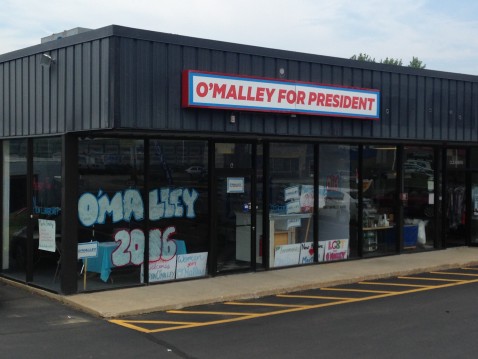WASHINGTON — Following the third-quarter filing deadline for campaign fundraising numbers Wednesday night, Democratic presidential candidates Hillary Clinton and Bernie Sanders boasted substantial hauls.
But long-shot White House hopeful Martin O’Malley, Maryland’s former governor, declined to release his fundraising numbers and instead unveiled a plan to reform campaign finance laws.
The campaigns have until Oct. 15 to release their financial details, but both Sanders and Clinton took Wednesday’s filing deadline as an opportunity to showcase their war chests. Clinton campaign officials said they raised $28 million between July 1 and Sept. 30, while Sanders narrowed the gap with a $25 million haul, according to several news reports.
In the second quarter, spanning April through June, Clinton’s campaign boasted a much larger financial advantage, bringing in $47 million to Sanders’ $15 million and O’Malley’s $2 million.
Another poor performance in the third quarter for O’Malley could be detrimental to his campaign’s viability, said Michael Hanmer, research director at the University of Maryland’s Center for American Politics and Citizenship. Hanmer said he expects the ex-governor’s campaign to look for any positive spin it can find in the numbers.
“It’s hard to imagine they’ll be very favorable relative to Clinton and Sanders, but if he showed improvement that’s something they can pitch to supporters in terms of showing momentum,” Hanmer said. “It could be in terms of dollars, in terms of number of supporters and who those supporters are or if there are any large supporters who are influential.”
While short funds and low poll numbers could point to an early exit for O’Malley, Hanmer said the 52-year-old candidate may stay in the race to help set the agenda and position himself for another campaign in the future.
O’Malley Thursday introduced a campaign finance reform proposal to “get big money out of politics,” a move which aides said was intentionally timed to follow Wednesday’s fundraising deadline.
“This week marks the end of another campaign fundraising quarter,” O’Malley said in a statement. “I’m not naïve: campaign resources are important. But the staggering figures required to run for the highest office in the land aren’t as much a sign of muscle as they are an indication just how broken our democracy is.”
O’Malley’s plan calls for overturning the Supreme Court’s 2010 Citizens United decision that allowed unrestricted campaign spending from corporations, as well as strengthening constitutional voting protections and redrawing of congressional districts. His plan also pushes for public financing of congressional elections, including proposals to match donations and give tax breaks to small donors.
In 2013, O’Malley signed a campaign finance law that raised Maryland’s
contribution limits for the first time since 1991, while also closing loopholes companies used to evade the limits. The law also imposed stricter enforcement of the state’s campaign financing system.
John Rauh, founder of Americans for Campaign Finance Reform, praised O’Malley’s goal of publicly financing congressional elections within five years. His statement was released by the O’Malley campaign.
“In an age where voters have become understandably cynical with politics, Governor O’Malley’s leadership plan for reforming our system of financing congressional elections is vital if we are to restore confidence in our democracy and, thereby, able to move forward to meet our challenges,” Rauh said.
Clinton and Sanders have both said they support comprehensive campaign finance reform while on the campaign trail. A variety of proposals have been introduced on Capitol Hill, including one by Rep. John Sarbanes D-Towson, but have failed to gain traction in the Republican-controlled Congress.

